|
Genres, Themes, Actors, and Directors:
- Amateur Sleuths
- Brian De Palma Films
- John Travolta Films
- Nancy Allen Films
- Political Conspiracy
Response to Peary’s Review:
Peary writes that this film “allowed Brian De Palma to combine his obsessions with the Kennedy assassination-conspiracy, the themes of Antonioni’s Blow-Up, and the visual style of Hitchcock.” He notes that the “first half of the picture is prime De Palma, but then the picture becomes bogged down with self-conscious camera work”, and he adds that at least “if you don’t care about the characters, you’ll be intrigued by the editing in the final sequence.” I’m in agreement with Peary’s tepid assessment of this atmospherically shot (by DP Vilmos Zsigmond) but disappointing thriller in which De Palma “refuses to develop Allen’s character” — or more accurately, fails to provide her with much of a meaningful presence other than as a bubble-headed foil. Travolta’s character comes across much better, and his lengthy audio-investigation sequence is impressively shot:
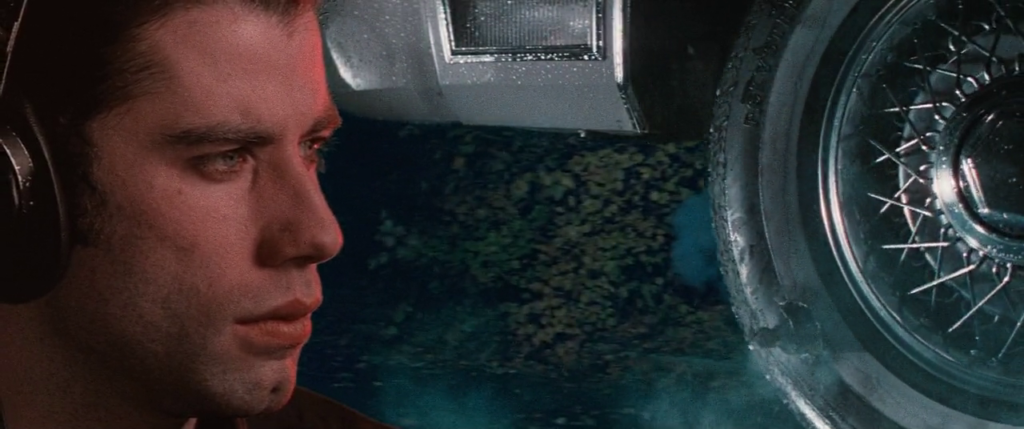
… but it’s not enough to redeem this film over-all as must-see.
Note: It was interesting watching this hour-long discussion between De Palma and Noah Baumbauch about the making of Blow Out, and hearing De Palma describe movies in this way:
“We create illusions for you to fall in love with. That’s something totally unique to cinema: beautiful women doing unusual, interesting, exciting things. We follow them, we look at them, and we get involved with them. It’s one of the basic tools of movies… It’s a gun and a girl. With a gun, when’s somebody going to fire it? With a girl, when’s somebody going to undress it?” (bold mine)
If “girls” (not women) are viewed simply as beautiful objects for audience members to watch and enjoy, it’s no wonder that Allen (De Palma’s wife at the time) — as well as the other females in this film — come across literally as pretty pawns in the bloody proceedings. Thank goodness Travolta is such a sympathetic male character.
Redeeming Qualities and Moments:
John Travolta as Jack
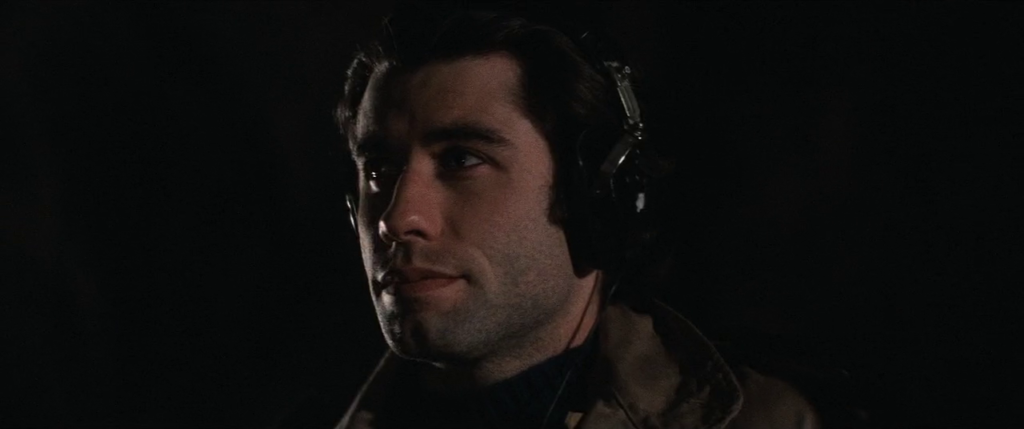 Atmospheric cinematography
Atmospheric cinematography
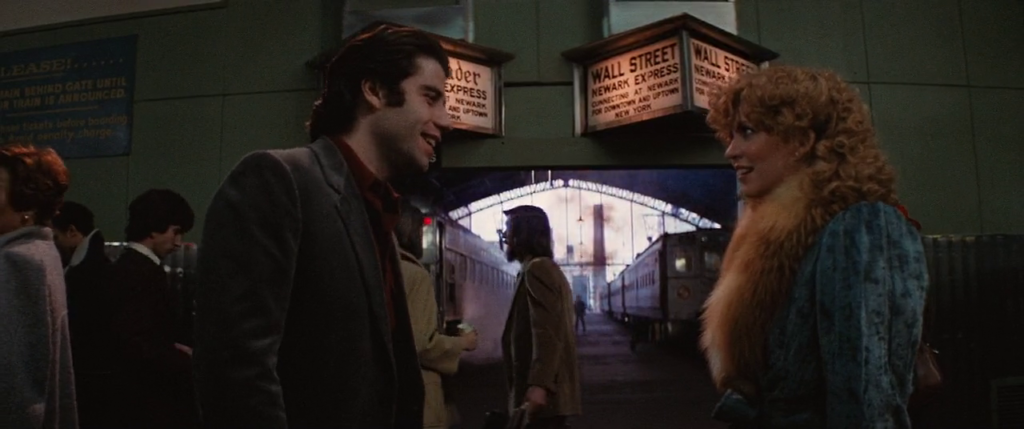 Fine location shooting in Philadelphia
Fine location shooting in Philadelphia
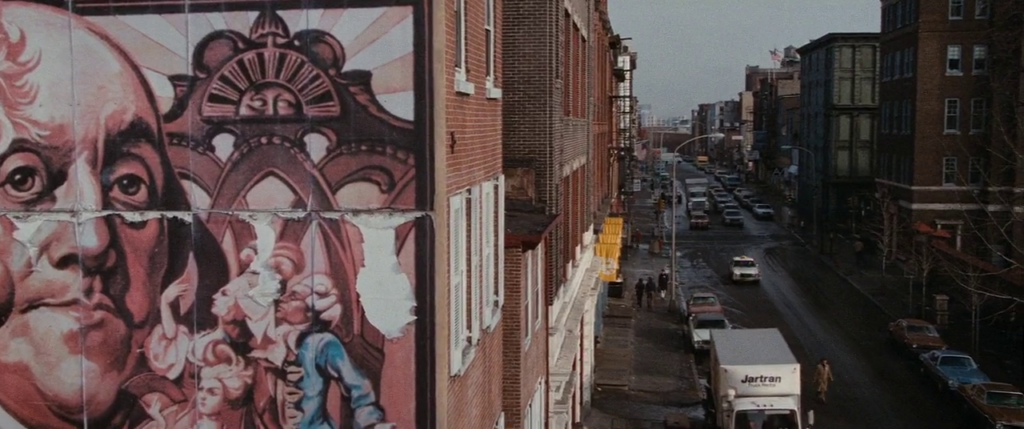
Must See?
No, though it’s worth a one time look.
Links:
|



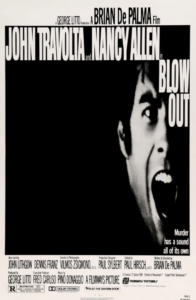

4 thoughts on “Blow Out (1981)”
⭐️⭐️⭐️1/2 out of ⭐️⭐️⭐️⭐️
Exceptional thriller only let down by the crushing ending; otherwise superb and arguably Travolta’s best performance. Not a significant film in any historical sense so not must see, but highly recomended.
Not must-see but it’s a nice attempt at the theme of ‘the cover-up’ – esp. the political cover-up. (I happen to be fascinated by such cover-ups. Imagine how many there have been throughout time… even recently… and how many will continue to happen.)
It’s unfortunate that ‘Blow Out’ isn’t a better film than it is. Maybe if, instead of handling the screenplay alone, De Palma had hired someone who was more serious-minded about the subject matter… he might have met with a sharper result.
As it is, De Palma spends more time than necessary early on – indulging his ‘surprise’ re: the opening slasher sequence. It takes awhile before we’re properly engaged in the actual plot. And it’s then a patchy affair, all told.
Best scene: towards the end, when Allen wants to come clean but her partner Dennis Franz tries to get her to ‘see reason’. (As written, Allen’s character is not all-that-bright but De Palma needlessly goes overboard when he has Allen saying things like “What do ya mean, ‘sound effects’?” and “What do ya mean, ‘wire’?”)
Near the end, the plot construction gets a little desperate to include thrills (and make Allen even *more* gullible and *more* stupid).
Most disappointing: Travolta’s character takes a nosedive when his ultimate decision re: what to do with Allen’s recorded voice is heartless.
I suppose the shallow De Palma sees Travolta as immortalising her … a way of ensuring she’s remembered.
I watched the Noah Baumbach documentary on De Palma recently and it’s made far too much from the point of view of worship. Now, I count myself as a DP fan through and through but he’s a controversial figure and is considered a misogynist by many; my writer wife thinks he can’t write women for toffee and can’t write women’s stories without offsetting them as a way to tell his male stories.
A good example is Casualties of War where the death of the leading lady is essentially a device to tell the journey of the leading man. Much as I love many of his films, I have to agree.
I really wish the doc had been more warts and all and interrogated him thoroughly about the controversy. I also wish he’d lightened up a bit because he can be charming and has a nice smile. Much of the doc was po-faced but it just made him come over as “I showed ’em, I stuck it to the studios and was proven right”.
Story after story seemed to end that way which makes him seem very Partridgian (reference to Steve Coogan’s character Alan Partridge, a very un-self aware tool).
Very interesting… I just took a pause on re-watching De Palma’s GFTFF films to watch “De Palma” (2015) — the documentary you mention here.
I actually gained more respect for him as an artisan after listening to him describe his work over the years — he had ideas that he felt would work well, tried his best to stay true to them (and not throw his colleagues/friends under the bus), and always maintained a fascination with the craft of filmmaking. His equation of himself with Keith Gordon’s character in “Dressed to Kill” (which I’m about to review next) was telling. He acknowledges his messed up background (his father cheating on his mom, everyone in his family being “ego-driven”) and how this likely impacted him.
I think your wife is right in terms of his inability to write effectively for/about women. That’s a flaw. As long as a male director continues to naively objectify women the way De Palma does, that will lead to serious gaps in quality and credibility no matter his incredible skill in so many other areas.